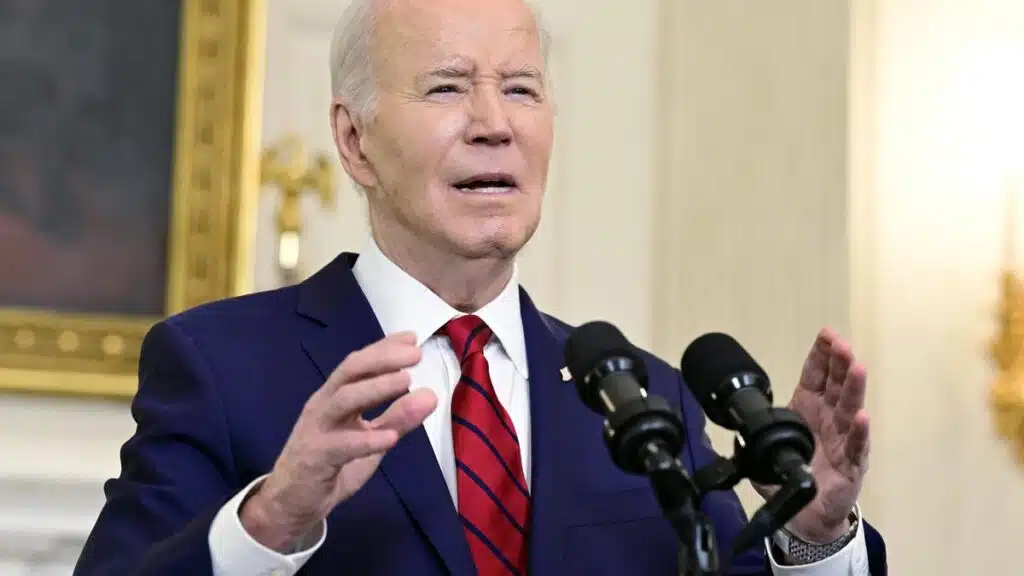Biden Signs Legislation Potentially Impacting TikTok’s Future
President Joe Biden has signed a significant piece of legislation that could have far-reaching implications for TikTok, a widely-used social media platform. Despite the bill’s passage, TikTok and other stakeholders have signaled their intent to contest the measure in court.
Thank you for reading this post, don't forget to subscribe!The Legislative Landscape
Passed as part of a $95 billion aid package for various countries including Ukraine and Israel, the bill received a decisive 79-18 vote in the US Senate late Tuesday. This legislation grants TikTok’s parent company, ByteDance, a window of up to one year to sell the platform to a buyer approved by US authorities.
TikTok’s Response
Following the enactment of the law, Shou Chew, TikTok’s CEO, took to the platform on Wednesday to express disappointment. Chew affirmed TikTok’s commitment to challenging the law in court, assuring users that the company will vigorously defend their rights, citing confidence in their legal position.
Legislative Evolution
Originally passed by the House in March, the legislation initially mandated TikTok’s divestment within six months to avoid a ban. However, this version failed to garner sufficient support in the Senate. The current iteration extends the divestment period to nine months, with the potential for a three-month extension.
National Security Concerns
Bipartisan concerns over TikTok’s potential national security implications have long circulated in Washington. Lawmakers fear that the platform, with its over 150 million American users, could be exploited by the Chinese government for espionage or disinformation campaigns. TikTok, however, vehemently denies these allegations.
Legal Challenges and Uncertainties
Legal challenges are widely anticipated from various quarters, including free speech advocates, the tech industry, and others. The absence of concrete evidence linking TikTok to Chinese government surveillance could bolster these challenges.
The Bill’s Provisions
The legislation aims to compel ByteDance to divest TikTok to a US-approved buyer, ensuring that the company loses access to US user data and control over the platform’s algorithm. Failure to comply within nine months could result in TikTok’s removal from US app stores, with the potential for a one-year extension.
Shifts in Political Stances
Former President Donald Trump, who previously advocated for TikTok’s ban, has voiced a change in position. While still expressing concerns about the platform’s security risks, he now opposes a ban due to concerns for its young user base.
Opposition and Critique
Opposition to the bill comes from various quarters, including free speech and digital rights groups, as well as security experts. Critics argue that singling out TikTok fails to address broader issues with social media and advocate for comprehensive digital privacy legislation.
Electronic Frontier Foundation’s Critique
The Electronic Frontier Foundation has criticized the bill as unconstitutional and authoritarian. They argue that it could inadvertently strengthen the monopolies of other tech giants without adequately addressing privacy concerns.
Fight for the Future’s Perspective
Similarly, Fight for the Future has condemned the bill as one of the “stupidest and most authoritarian” pieces of tech legislation. They assert that it undermines free expression and human rights and could impede progress toward more meaningful privacy and antitrust reforms.
In summary, the passage of this legislation marks a significant development in the ongoing debate over TikTok’s presence in the US. Legal challenges, shifting political stances, and diverse stakeholder perspectives promise to shape the platform’s future in the American market.
What would the bill do?
The bill is aimed at forcing ByteDance to sell TikTok to a buyer that American officials are OK with, as well as guaranteeing that ByteDance no longer has access to US user data or control over the TikTok algorithm that decides what videos American users see.
If TikTok doesn’t comply within nine months of the bill taking effect, the government could require the removal of its app from US app stores. Under the new legislation, that period could potentially be extended to a full year.
What’s next?
While Biden pledged to sign the original bill if it made it through Congress, former President Donald Trump, the presumptive Republican nominee running against Biden in November, has said he doesn’t support a ban.
After originally calling for a ban during his presidency, Trump said in March on CNBC’s Squawk Box that though he still thinks the app is a danger to national security, he no longer thinks it should be banned, saying that “there are a lot of young kids on TikTok who will go crazy without it.”
Trump went on to say that banning TikTok would only boost the power of Facebook, which he referred to as an “enemy of the people.”
Who else opposes the bill?
Free speech and digital rights groups, as well as some security experts, have long opposed the idea of a ban, saying that singling out TikTok doesn’t do anything to solve the broader problems with social media as a whole.
Instead, they argue that lawmakers would be better off passing comprehensive digital privacy laws that would protect the personal information of Americans by stopping all social media companies from collecting it and selling it to data brokers.
In a blog post, the Electronic Frontier Foundation said in March that until that happens, even if TikTok is banned or sold, nothing is stopping the Chinese government, or others, from just buying up that same data.
“Ultimately, foreign adversaries will still be able to obtain our data from social media companies unless those companies are forbidden from collecting, retaining, and selling it, full stop,” the EFF said.
Digital privacy rights group Fight for the Future agreed. In a Tuesday statement its director, Evan Greer, called the bill “one of the stupidest and most authoritarian pieces of tech legislation we’ve seen in years.”
“Not only is this bill laughably unconstitutional and a blatant assault on free expression and human rights, it’s also a perfect way to derail momentum toward more meaningful policies like privacy and antitrust legislation that would address the harms of big tech and surveillance capitalism,” Greer said.
Greer added that banning TikTok in the absence of data privacy regulation will only solidify the monopolies of Meta and Google, without doing anything to protect Americans from data harvesting or government propaganda.











